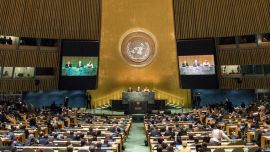Argentina is on the way to completing its worst statistical week yet of the coronavirus pandemic, after officials confirmed another daily high of 718 new infections on Friday.
Fourteen deaths were also recorded, with fatalities registered in the provinces of Córdoba, Chaco, Río Negro and Buenos Aires, as well as Buenos Aires City.
To date, at least 10,649 have contracted Covid-19 in Argentina since the pandemic began, with 433 deaths. On Friday morning, officials had already confirmed the deaths of three individuals overnight.
Health Ministry officials said that 8.9 percent of infections are considered “imported,” with 43.6 percent a result of people coming into close contact with those with Covid-19. Just over 31 percent are a result of community transmission, with the remainder still under investigation.
The World Health Organisation (WHO) said Friday that Latin America was the new “epicentre” of the global pandemic, noting surges in Mexico and Brazil in particular. Argentina’s numbers, while still low when considered against the rest of the region, have risen throughout the week, in line with health experts who predict a peak will hit the country in early June.
Infectologists attribute the dramatic increase in cases to the arrival of the coronavirus in the crowded low-income neighbourhoods. In the City, approximately 350,000 people live in shantytowns, many of which face problems with water and plumbing, job instability and overcrowding.
Another factor, according to epidemiologists, is the loosening of the mandatory lockdown measures put in place on March 20 by the government. In recent weeks, some provinces and businesses have been allowed to return to some form of activity, rather than just those that were deemed essential at the beginning of the lockdown.
Amid the record surge, and after meetings with health experts, officials and the heads of the Buenos Aires City and Province governments, President Alberto Fernández concluded this week that there is "no margin" to further liberalise quarantine measures in Greater Buenos Aires, the country’s hardest-hit region.
The decision was unanimous and not difficult to reach, according to reports.
Sources in the government said that Fernández, City Mayor Horacio Rodríguez Larreta and provincial Governor Axel Kicillof were all in agreement that "there is no margin to make anything more flexible" given the current situation.
Controls are likely to be extended in the metropolitan area in the coming weeks tomorrow in a speech from the Olivos presidential residence. New circulation permits are also expected to be introduced, with a “unique authorisation” system that will require everyone to re-register and re-apply for permission to travel, Transport Minister Mario Meoni said Friday.
The national, city and provincial governments have agreed on three main points, which will be announced tomorrow. There will be no new opening of businesses or commercial activities, new restrictions on the use of public transport and a renewed focus on the poorest neighbourhoods.
Early detection efforts are expected to be stepped up, with greater testing in shantytowns and poor areas. Food assistance support programmes will also be improved.
City Deputy Mayor Diego Santilli said Friday that the City government wanted to retain existing rules allowing children to leave their homes with their parents for an hour over the weekend.
– TIMES/NA





















Comments